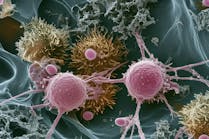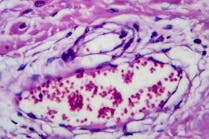A research team has designed a molecule with potential to interfere in a new way with altered proteins that cause abnormal growth in 35 percent of pancreatic cancers.
Published online in Nature Communications, a new study from NYU Grossman School of Medicine found that a molecule called a monobody clings to cancer-causing versions of the KRAS protein and keeps them from transmitting their signals, as reported in a news release from the university. Changes in the DNA of the KRAS gene — which encodes a molecular switch that toggles between active and inactive states to regulate growth — cause the related protein to become “stuck in the on mode.” Cells with such mutations continually multiply and give rise to cancer.
Called 12VC1, the monobody is part of a class of compounds originally invented by lead study author Shohei Koide, PhD, in 1998. Formed from a simple protein framework, a parental monobody can be turned by automated technologies into trillions of slightly different versions. The study authors screened such a “library” to find 12VC1, which happened to have the right shape and properties to interrupt signals passed on by certain abnormal KRAS proteins. In this way, the study monobody slowed tumor growth by 90 percent over 6 weeks in mice with a model of pancreatic cancer.
While the research team first described the potential for a KRAS-targeting monobody in a 2016 paper, the current study went further to demonstrate that it could selectively target abnormal KRAS proteins. It also showed the value of attaching it to an enzyme fragment called VHL, which can send the abnormal KRAS proteins to degradation machines in cells called proteasomes, resulting in sustained inhibition of abnormal KRAS activity.
KRAS is a member of one of the most frequently mutated protein families in human cancers, but investigators have failed to find effective inhibitors to it for more than three decades, researchers say. A major obstacle has been that KRAS does not have a suitable pocket to which typical drugs can tightly latch on.
The only successful drugs against mutant KRAS to date, which are in the late stages of development, act by forming a chemical (covalent) bond with a unique chemically reactive group in one specific KRAS mutant protein, researchers said. Such drugs only work when the mutant KRAS protein has a reactive group in the “right” position to be attacked by the drug.
For this reason, there is only one covalent drug type that can interfere with just one cancer-causing KRAS mutant protein called G12C. While present in 20 to 25 percent of lung cancers, this mutant is there in just 1 to 3 percent of pancreatic cancers, the researchers say, with other mutants more common.
Given these challenges, the field has long sought to interfere KRAS mutants in another way. When KRAS is in the active state, its surfaces can interact based on shape and charge (non-covalently) with proteins like RAF that pass on the message that cells should multiply. Many attempts to block such non-covalent interactions have not advanced past the early stages because they either shut down both normal and mutant KRAS because these proteins differ only slightly, or because they did not bind to mutant KRAS tightly enough.
The monobody generated in the current study, 12VC1, represents the first agent that selectively prevents two KRAS mutants, G12C and G12V, from binding RAF. Together, these mutants cause 35 percent of pancreatic cancers. Remarkably, 12VC1 binds to the KRAS mutants 400 times more tightly than normal KRAS, leaving the latter free to perform its many cellular functions. The study authors also used an approach called X-ray crystallography to reveal at the level of atomic structure why 12CV1 has this unique capability.
In the current study, the monobody was delivered by a harmless virus carrying the monobody gene. The virus invaded cells to deposit genetic instructions, which were then followed by the target cell to produce the desired monobody.





